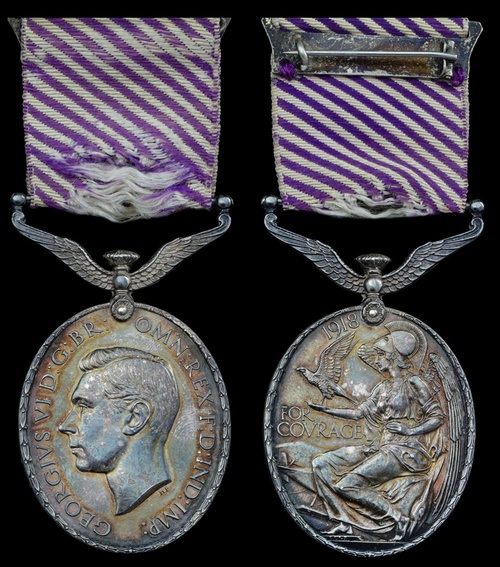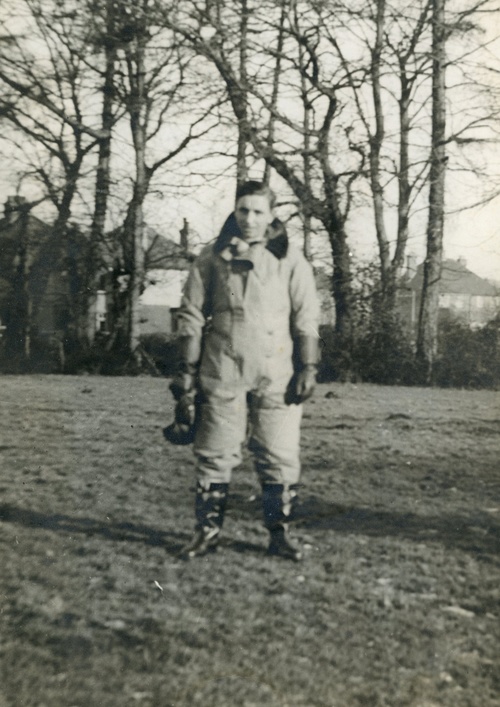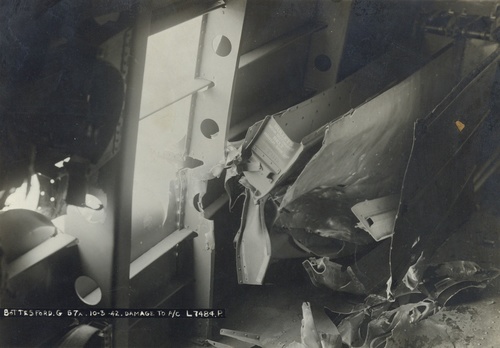Auction: 19003 - Orders, Decorations and Medals
Lot: 405
Sold by Order of a Direct Descendant:
'Things look bad. It looks like "curtain." But Sergt. Jack Everett, of No. 207 Squadron, is wireless operator of that plane, and Sergt. Everett does not even stop to think about danger.
He goes straight into the flaming ammunition, beating the fire with his bare hands and stamping on the heated bullets until he has the flames under control. That is why he now gets the D.F.M.'
A newspaper on the exploits of Sergeant J. Everett
An Immediate Second World War 1942 D.F.M. awarded to Sergeant J. Everett, No. 207 Squadron, Royal Air Force Volunteer Reserve, who gallantly beat out an ammunition fire during a hair-raising raid over enemy territory in March 1942 - the fire began when a German shell from the Essen anti-aircraft guns narrowed on his Wellington; Everett would lose his life before war's end in a mid-air collision
Distinguished Flying Medal, G.VI.R. (751065 Sgt. J. Everett. R.A.F.), on original ribbon and wearing pin, extremely fine
D.F.M. London Gazette 7 April 1942. The original recommendation states:
'On the night of 8th/9th March, 1942, Sergeant Everett was the First Wireless Operator on an aircraft detailed to attack a target in Essen. Shortly after the bombs were dropped, the aircraft received what appeared to be a direct hit from a shell. The shell did not explode but, on its passage through the fuselage, it went through the starboard ammunition box. There was a spare belt of ammunition in the box which became broken up through the force of the impact and the charges from the broken bullets caught fire. The fire which commenced to spread was reported by the Air Gunner in the mid-upper turret. Although there was danger from the remaining ammunition in the box which the heat was causing to explode, Sergeant Everett went straight to the fire and proceeded to put it out with his hands and feet. Having gained immediate control of it, he then collected a fire extinguisher and put out the fire completely. By this Sergeant's quick action and complete disregard for his personal safety, the fire was dealt with effectively before it came out of control and the aircraft and crew landed safely back at Base.'
Jack Everett was born in 1921 at Brighton, East Sussex, the son of Herbert George Everett. He worked in Brighton as a manufacturing chemist at Arthur H. Cox & Co. before enlisting in in May 1939 as Wireless Operator and Air Gunner. He was awarded the D.F.M. having flown 31 sorties totalling 186.35 flight hours and received his Medal at Buckingham Palace on 29 September 1942.
He later died in a mid-air collision on 13 July 1944 between two Wellington aircraft of No. 14 O.T.U. (Market Harborough). Unusually, owing to the non-operational nature of the flight, each aircraft only had 2 airmen on board, a Staff (Instructor) Pilot and a Staff Wireless Operator. Both Everett and his Pilot, Flight Lieutenant Alfred Cecil Shilleto, were lost aboard Wellington XLN509 which crashed into the North Sea.
According to family repute, no bodies were ever recovered. Isobel Elliott later visited his airbase and the coffin was marked 'not to be opened under any circumstances'. Aged 23, Jack Everett is buried in the Brighton City (Bear Road) Cemetery, his gravestone bearing the words of his wife Mary Agnes, 'In loving memory of my husband Jack'.
Sold with copied research and the following original documentation:
(i)
An original portrait and full-length photograph of Sergeant Everett, together with 3 postcard photographs of his Avro Manchester twin-engine medium bomber, and an outstanding photograph of the interior of his aircraft following the on-board fire.
(ii)
An original Postagram from Air Marshal Sir Arthur Travers 'Bomber' Harris, signed in ink and dated 17 March 1942:
'My warmest congratulations on the award of your Distinguished Flying Medal'.
(iii)
Two further letters of congratulations from H.Q., No. 5 Group, including one from Air Commodore H. A. Haines, acting as S.A.S.O., Headquarters, No. 5 Group:
'The Air Officer Commanding, who is absent on 48 hours leave, wishes me to send you his congratulations on your well-deserved award of the Distinguished Flying Medal.
He further added to the typed letter, 'May I add my best wishes for the "Bar."'
(iv)
Original Buckingham Palace Investiture ticket, No. 4589, stamped 29 September 1942.
Subject to 20% VAT on Buyer’s Premium. For more information please view Terms and Conditions for Buyers.
Sold for
£1,800
Starting price
£950









